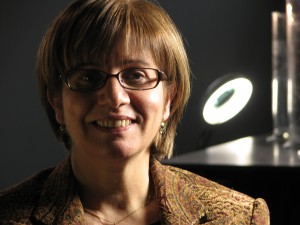 Francesca Calati
Francesca Calati
Participation in chemistry at St Helena Secondary College has tripled in the last few years. The secret? An innovative combination of practical chemistry and nanotechnology introduced into the classroom by Francesca Calati.
Francesca is the programme manager of Accelerated Curricula and Nanotechnology at St Helena, a government school in the Melbourne suburb of Eltham North. She realised that many of the school’s students didn’t ‘get’ chemistry. So she developed a practical chemistry course that engages the students and makes chemistry more relevant to them. Then, recognising the increasing importance of nanotechnology as a new enabling science, she developed a comprehensive programme in nanotechnology that bridges science and art.
Her school has now been recognised by the Victorian government as one of three specialist education centres in the State.
For successfully engaging her students in chemistry and nanotechnology, Francesca Calati receives the Prime Minister’s Prize for Excellence in Science Teaching in Secondary Schools.
Francesca developed her curiosity about the world around her with her father on their Sicilian farm. When the family migrated to Australia, one of the nuns at her new school recognised and nurtured Francesca’s growing interest in science and chemistry. A degree in chemistry resulted. But her family didn’t regard science as an appropriate career for her, so Francesca turned to teaching. Among hundreds of others over the years, the students of St Helena are the beneficiaries.
She joined the school in 1991 and set about modernising information technology teaching with the introduction of robotics, web-based learning and other initiatives.
Then, seeing that a generation of students was being lost to chemistry, she also started exploring ways to regain the interest of these students.
“They didn’t see chemistry as relevant to their lives,” she says. “So what we do is introduce them to the chemistry that’s in their daily lives. In the practical chemistry course, students make soap, detergents, hair gels and other products. And in the process they learn not just about the underlying chemical processes, but also about the role of chemistry in daily life. I hope they also become more critical as consumers — reading the labels and thinking about the contents.”
Francesca’s successes led naturally to an exploration of nanotechnology: the study and application of processes that occur at the molecular level, one billionth of a metre or smaller. The applications range from new means of drug delivery into the body to new materials a hundred times stronger than steel. Many in the field believe that nanotechnology will lead to societal changes as profound as those of the industrial revolution.
Francesca saw an opportunity to integrate nanotechnology in the class room and has developed school-wide curricula on the subject. She has also shown great skill in identifying partners and financiers for the initiative. She and her colleagues secured a $70,000 grant from the Victorian Department of Education to allow them to take professional leave to research and develop the nanotechnology programme.
The curriculum starts by revealing how the rules change in the world of this new science, exploring unexpected topics such as “What colour is gold?” Gold nanoparticles are actually red in colour, and are finding use in medical diagnostics and other applications. The students explore carbon nanotubes, surface treatments for glass, and nanotechnology in food and cosmetics.
The students are also taught to think critically about the applications and their implications for society in activities that range across science and arts subjects.
Earlier this year, the initiative won St Helena school a curriculum innovation award at the Victorian Education Excellence Awards. The next step is to take it to the wider school community. With the help of Nanotechnogy Victoria and communication consultants Bridge 8, Francesca is doing just that. She is creating a web-based e-learning package that will be available to teachers across Victoria.
But it’s not just in nanotechnology education where Francesca has made her mark. She is making a much broader contribution to science teaching in Victoria. She has been an external assessor for the VCE chemistry exam for 15 years; was an assessor for the Science Talent Search projects; a reviewer for the Nelson Chemistry VCE units 3 and 4 text book; and is a mentor of student teachers. She is highly regarded among her peers in Victoria and across Australia, and is a regularly invited speaker at teacher professional development conferences and in science curriculum workshops.
What’s next for Francesca? In addition to her teaching commitments, she has returned to university, studying at Monash University for a Bachelor of Formulation Science, which she is using to develop a cosmetics unit for her students.
Biographical details
1991-now St Helena Secondary College, teacher/information tech coordinator/programs manager
- Accelerated Curriculum (ACE) program manager
- Development and implementation of the nanotechnology program
- Introduced new technologies to the learning environment including the Internet, online learning and the computing competition
- Established the Science Talent Search
- Designed Year 11 Chemistry and Year 7-10 information technology curricula
1988-90 Genazzano FCJ College, part-time teacher
1989 Melbourne University, Research Officer (Maths and Girls)
1973-91 RMIT, Chemistry tutor
1985-87 Bibilbonty, Educational Books, owner and manager
1984-86 Red Cliffs Secondary College, emergency teacher
1971-73 Essendon High School, teacher/science coordinator
1971-73 Melbourne Zoo, Parkville Office/ticket sales/souvenir shop
Qualifications
2005-06 Awarded the Summer Scholarship at Victorian Pharmacy College, Monash University enabling a study project on the solubility of a herbicide.
2002-now Bachelor of Formulation Science (in progress), Monash University
1992 Graduate Diploma of Computing, University of Melbourne
1975 Italian I, II and III, University of Melbourne
1974 Diploma of Education, University of Melbourne
1973 Bachelor of Applied Chemistry, RMIT
Subjects taught
Chemistry VCE, Chemistry (Tertiary)
Mathematics, Science, Information Technology and Italian (years 7 to 12)
Membership of professional societies
Science Teacher’s Association of Victoria
Australian Society of Cosmetic Chemists
Chemistry Education Association
